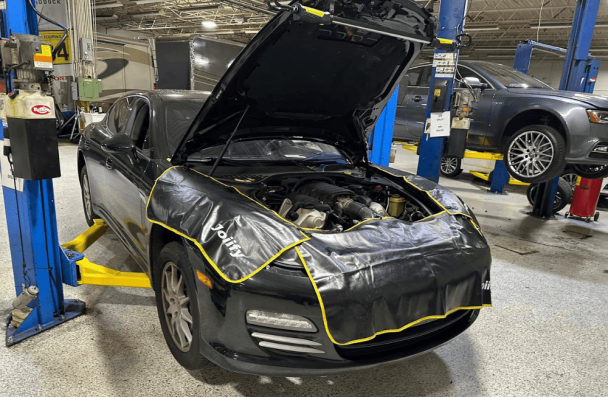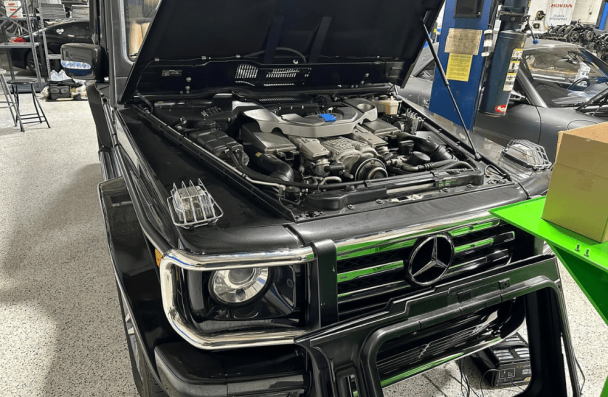Sophisticated engineering makes your BMW, Mini Cooper, or electric vehicle exciting to drive, but it also creates maintenance challenges that catch Gainesville owners off guard. BMW, Mini Cooper, and EV maintenance issues often stem from the very precision that makes these cars perform so well. The specific problems range from BMW cooling systems that fail without warning to Mini Cooper timing chains that can destroy engines catastrophically, along with electric vehicle maintenance needs that differ completely from traditional cars.
Atlanta Speedwerks specializes in addressing these exact challenges, and we’re breaking down everything Hall County drivers need to know. This guide explores why these vehicles demand specialized care, identifies the most common and costly problems, explains warning signs you cannot ignore, and reveals how proactive maintenance prevents expensive repairs. Understanding what makes these vehicles different equips you to make smarter maintenance decisions that protect your investment.
Why These Vehicles Are Different From Everything Else on the Road
European auto repair isn’t one-size-fits-all, and electric vehicles add another layer of complexity. BMW, Mini Cooper, and EVs use proprietary software, specialized components, and unique engineering that require manufacturer-level diagnostic tools and trained technicians. Generic repair shops often miss critical issues because they lack the specific knowledge and equipment these vehicles demand.
The BMW Maintenance Puzzle: What Keeps These Ultimate Driving Machines Running
BMW vehicles are engineered for performance and precision, but that engineering excellence comes with specific maintenance needs that Gainesville drivers should understand before problems become expensive.
Cooling System: The Achilles Heel of Modern BMWs
BMW cooling systems have earned a reputation for being both critical and vulnerable:
- Electric Water Pumps: Modern BMWs use electric water pumps that can fail without warning, particularly between 60,000 and 100,000 miles. Unlike traditional belt-driven pumps, electric pumps often fail suddenly, leading to immediate overheating.
- Expansion Tank Failures: The plastic expansion tanks become brittle over time, especially in Georgia’s heat. When they crack or split, you’ll lose coolant rapidly and risk severe engine damage.
- Thermostat Housing Issues: Plastic thermostat housings crack and leak. If you notice a sweet smell or see steam from under the hood, address it immediately.
- Prevention Strategy: Proactive replacement of cooling system components around the 70,000-mile mark prevents roadside breakdowns.
The Oil Leak Epidemic
BMW engines develop characteristic oil leaks as they age:
- Valve Cover Gasket Leaks: Common in N54, N55, and B58 engines, these start as minor seepage and progress to significant oil loss
- Oil Filter Housing Gasket: Creates oil drips that contaminate belts and create burning oil smells
- Oil Pan Gasket: Less urgent but messy, often discovered during routine inspections
- Timing Chain Cover Seals: More complex repair but necessary to prevent oil consumption issues
Regular inspections catch these leaks early, before low oil levels cause internal engine damage.
Electrical Gremlins That Confuse Generic Shops
Modern BMWs contain sophisticated computer systems that require proper diagnostic equipment:
- Battery Registration Requirements: When replacing a BMW battery, it must be electronically registered to the vehicle’s computer system. Failure to do this causes charging system problems and premature battery failure.
- Adaptive Systems: Everything from headlights to suspension uses sensors and computers that need proper calibration and occasional recoding.
Ready to get your BMW properly diagnosed? Learn more about our specialized approach.
Mini Cooper Maintenance: Small Car, Big Personality, Unique Challenges
Mini Coopers deliver fun, agile driving experiences, but they share many components with BMW and come with their own maintenance considerations.
The Timing Chain Time Bomb
This is the single most important Mini Cooper maintenance issue to understand:
The Problem: First and second-generation Minis with N14 and N18 engines have timing chain tensioners that fail catastrophically. When the tensioner fails, the timing chain jumps or breaks, causing valves to collide with pistons, resulting in complete engine failure.
Warning Signs You Cannot Ignore:
- Rattling noise on cold starts that disappears after warmup
- Reduced power and hesitation
- Check the engine light with timing-related codes
- Unusual engine noise during acceleration
Critical Timeline: If your Mini has over 60,000 miles and you’ve never had the timing chain addressed, schedule an inspection immediately.
Transmission Troubles
Mini Coopers offer both manual and automatic transmissions, each with distinct issues:
Automatic Transmission (Aisin 6-Speed):
- Mechatronic unit failures are causing harsh shifts or loss of gears
- Valve body issues leading to erratic shifting patterns
- Transmission fluid that requires replacement every 40,000 miles despite “lifetime fill” claims
Manual Transmission:
- Clutch wear accelerated by stop-and-go traffic
- Gear synchronizer wear in high-mileage vehicles
Cooling System Components That Age Poorly
Mini cooling systems use extensive plastic components that degrade in Georgia’s climate. Thermostat housing cracks, water pump failures, and expansion tank issues mirror BMW problems. Regular cooling system inspections and proactive replacement prevent overheating incidents.
Electric Vehicle Maintenance: The New Frontier of Car Care
Electric vehicles represent a fundamental shift in automotive technology. While they eliminate many traditional maintenance concerns, they introduce new considerations that Gainesville EV owners need to understand.
What EVs Don't Need (And What They Still Do)
Maintenance You Can Forget About:
- Engine oil changes
- Transmission fluid services
- Spark plug replacements
- Timing belt services
- Exhaust system repairs
What Still Requires Attention:
- Brake systems and fluid
- Tire rotation and alignment
- Suspension components
- Cabin air filters
The 12-Volt Battery Mystery
Your electric vehicle still has a regular 12-volt battery, and it’s critical to vehicle operation. The 12-volt battery powers all the computers, displays, and control systems. When this small battery fails, your EV won’t start or operate, even if the main battery pack is fully charged.
Brake Systems: The Counterintuitive Maintenance Need
Regenerative braking reduces wear on traditional brake components, but brake rotors and pads that aren’t used frequently develop surface rust and corrosion. Even with regenerative braking, brake fluid absorbs moisture over time and requires replacement every 2-3 years.
Tire Wear Acceleration
Electric vehicles are harder on tires than comparable gasoline cars due to added weight and instant torque delivery. Rotate tires every 5,000-6,000 miles, maintain proper inflation pressure for range optimization, and invest in quality tires designed for EV characteristics.
Software Updates and the Digital Maintenance Dimension
EVs receive over-the-air software updates that can fix bugs and improve performance. However, not everything can be resolved remotely. Proper diagnostic equipment is essential for identifying whether an EV issue is software-related, sensor-related, or involves actual hardware failure.
Curious about EV maintenance for your specific vehicle? Schedule a consultation to discuss your EV care needs.
The Cost of Ignoring Specialized Maintenance Needs
Acting proactively is what separates smart vehicle ownership from expensive surprises. BMW cooling system neglect turns minor repairs into major engine rebuilds. Ignoring Mini timing chain rattles transforms preventative service into engine replacement. Neglected EV brake fluid leads to complete brake system overhauls. The pattern is clear: specialized vehicles require specialized attention, and proactive maintenance always costs less than reactive repairs.
How Atlanta Speedwerks Approaches BMW, Mini, and EV Care
At Atlanta Speedwerks in Gainesville, we’ve recently expanded our team with specialized BMW, Mini Cooper, and Tesla technicians who bring focused expertise to these unique vehicles. Our approach combines racing heritage with a proactive car maintenance philosophy.
We educate our clients about what’s coming and help prioritize immediate needs versus future maintenance. Our 58-point digital vehicle inspections catch problems before they become expensive failures.
What Sets Our Approach Apart:
- Manufacturer-Level Diagnostics: We use the same diagnostic tools and software that dealerships use, but without dealership pricing
- Proactive Inspection Process: Every vehicle receives a comprehensive inspection to identify developing issues early
- Transparent Communication: We explain what your vehicle needs, what can wait, and why each service matters
- Quality Parts: OEM or OEM-equivalent components ensure proper fit and longevity
Every service is backed by our 2-year/24,000-mile TechNet warranty. We offer complimentary Uber and Lyft service, after-hours drop-off, and TechNet financing.
Frequently Asked Questions
What are the common problems with BMW cars?
Common BMW problems include cooling system failures (water pumps and expansion tanks), oil leaks from valve cover and oil filter housing gaskets, timing chain issues, and electrical system faults requiring battery registration. These issues typically appear after 60,000 miles and require specialized diagnostic equipment.
How often does a Mini Cooper need maintenance?
Mini Coopers require oil changes every 10,000 miles, but critical maintenance includes timing chain inspection around 60,000-80,000 miles and replacement by 100,000 miles to prevent catastrophic engine failure. Transmission fluid should be changed every 40,000 miles, despite lifetime fluid claims.
Do electric cars need less maintenance?
Electric cars eliminate engine oil changes, transmission services, spark plugs, and exhaust repairs, reducing maintenance significantly. However, EVs still require brake fluid replacement every 2-3 years, tire rotations every 5,000-6,000 miles, 12-volt battery replacement, and cabin air filter changes.
What is the most expensive thing to fix on a Mini Cooper?
The most expensive Mini Cooper repair is timing chain failure, which requires a complete engine rebuild or replacement when the chain breaks. Proactive timing chain and tensioner replacement should be performed around 80,000-100,000 miles or immediately if rattling noises occur on cold starts.
Why do BMW cooling systems fail?
BMW cooling systems fail because they use plastic components that become brittle from heat cycling and age, typically between 60,000-100,000 miles. Electric water pumps also fail without warning signs, and hot climates accelerate the degradation of these plastic parts.
Gainesville's Trusted Shop for BMW, Mini Cooper, and EV Maintenance
You’ve learned what can go wrong with these sophisticated vehicles. Now it’s time to partner with a shop that prevents those problems. Atlanta Speedwerks has invested in specialized BMW, Mini Cooper, and EV technicians because generic service isn’t good enough for vehicles engineered with this level of precision. Don’t let that check engine light turn into a roadside emergency.
Connect with us today by calling or texting 678-971-5300, scheduling your appointment online, or stopping by our shop at 470 Woodsmill Rd., Suite E, Gainesville, GA 30501. Proudly serving Gainesville, Hall County, Oakwood, Flowery Branch, and the Lake Lanier community with care that exceeds dealership standards without dealership pricing.




